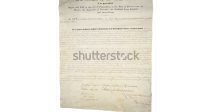Introduction: The Supreme Court Case of Citizens United v. FEC
The Supreme Court Case of Citizens United v. FEC (2010) is a landmark decision that reshaped the landscape of campaign finance in the United States. This case brought about significant changes in how corporations and unions can influence elections. Understanding its background, implications, and the debates it sparked is crucial for comprehending modern American political campaigns.
Read also : The Federalist Papers (1788): The Foundation of American Democracy
The Background: How It All Began
The Supreme Court Case of Citizens United v. FEC originated from a dispute over a political documentary. In 2008, Citizens United, a conservative nonprofit organization, sought to air a film critical of then-presidential candidate Hillary Clinton. The film, titled “Hillary: The Movie,” was intended to be broadcast on television during the 2008 Democratic primary season.
However, the Bipartisan Campaign Reform Act (BCRA) of 2002, commonly known as the McCain-Feingold Act, prohibited corporations and unions from using their general treasury funds for “electioneering communications” within 30 days of a primary or 60 days of a general election. This provision aimed to prevent undue influence from wealthy special interests in the electoral process.
Citizens United challenged the FEC’s ruling, arguing that the BCRA violated the First Amendment by restricting free speech. The case quickly escalated, ultimately reaching the Supreme Court. The Court’s decision would have far-reaching implications for campaign finance laws in the United States.
The Supreme Court’s Decision: A Landmark Ruling
On January 21, 2010, the Supreme Court delivered its decision in Citizens United v. FEC. In a 5-4 ruling, the Court held that corporate funding of independent political broadcasts in candidate elections cannot be limited under the First Amendment. This decision effectively overturned previous campaign finance restrictions and granted corporations and unions the same free speech rights as individuals.
The majority opinion, written by Justice Anthony Kennedy, argued that the prohibition on independent expenditures by corporations and unions was a restriction on free speech. The Court reasoned that the government could not suppress political speech on the basis of the speaker’s corporate identity. This ruling allowed corporations and unions to spend unlimited amounts on political campaigns, as long as the expenditures were made independently and not directly coordinated with a candidate’s campaign.
The Implications: Changing the Game of Campaign Finance
The Supreme Court Case of Citizens United v. FEC fundamentally altered the landscape of American campaign finance. By allowing unlimited independent expenditures by corporations and unions, the decision paved the way for the creation of super PACs (Political Action Committees), which can raise and spend unlimited amounts of money to advocate for or against political candidates.
The Rise of Super PACs
Following the Citizens United decision, super PACs quickly became major players in the political arena. These organizations can raise vast sums of money from individuals, corporations, and unions, and use these funds to influence election outcomes through advertising and other forms of communication. Unlike traditional PACs, super PACs are not subject to contribution limits, provided they operate independently of the candidates they support.
Super PACs have dramatically increased the amount of money in politics, leading to concerns about the influence of wealthy donors and special interest groups. Critics argue that this influx of money undermines the democratic process by allowing a small number of wealthy individuals and corporations to have disproportionate influence over elections and policy decisions.
Increased Political Spending
The Citizens United decision has led to unprecedented levels of political spending. In the years following the ruling, election cycles have seen record-breaking amounts of money spent on campaigns. This surge in spending has raised questions about the impact of money on political outcomes and the potential for corruption.
Supporters of the decision argue that it promotes free speech and allows for a more vibrant and diverse political debate. They contend that more money in politics enables a wider range of voices to be heard and enhances the democratic process. However, detractors worry that the increased spending drowns out the voices of ordinary citizens and erodes public trust in the political system.
The Legal Reasoning: Exploring the Majority Opinion
The majority opinion in the Supreme Court Case of Citizens United v. FEC was penned by Justice Anthony Kennedy. The opinion emphasized the importance of the First Amendment and the protection of free speech, regardless of the speaker’s identity.
Free Speech and Corporate Identity
Justice Kennedy argued that the government could not discriminate against certain speakers based on their corporate identity. He maintained that political speech is indispensable to democracy and that the First Amendment protects the right to engage in political discourse. According to Kennedy, the prohibition on independent expenditures by corporations and unions amounted to a restriction on free speech.
The opinion also noted that independent expenditures do not pose the same risk of corruption as direct contributions to candidates. By differentiating between independent expenditures and direct contributions, the Court concluded that the restrictions imposed by the BCRA were not justified and violated the First Amendment.
Dissenting Views
The dissenting justices, led by Justice John Paul Stevens, vehemently disagreed with the majority’s reasoning. They argued that allowing unlimited corporate spending in elections could lead to corruption and undermine the integrity of the democratic process. The dissent expressed concern that corporations, with their vast financial resources, could dominate political discourse and drown out the voices of ordinary citizens.
The dissenting opinion also highlighted the potential for quid pro quo corruption, where elected officials feel beholden to their corporate benefactors. Justice Stevens warned that the decision would erode public confidence in the political system and lead to an increase in the influence of money in politics.
The Impact on Future Elections: A New Era
The Supreme Court Case of Citizens United v. FEC ushered in a new era in American elections. The decision has had a profound impact on how campaigns are financed and conducted, with lasting implications for the political landscape.
Influence of Wealthy Donors
One of the most significant impacts of the Citizens United decision has been the increased influence of wealthy donors in political campaigns. With the ability to contribute unlimited amounts to super PACs, a small number of affluent individuals and corporations have gained substantial sway over elections and policy decisions. This concentration of power has raised concerns about the potential for corruption and the erosion of democratic principles.
Changes in Campaign Strategies
The decision has also led to changes in campaign strategies. Candidates and political parties now rely heavily on super PACs to fund their campaigns, shifting the focus from traditional fundraising methods to courting large donors who can make significant contributions. This shift has altered the dynamics of political campaigns, with candidates spending more time fundraising and less time engaging with voters.
The Ongoing Debate: Pros and Cons
The Supreme Court Case of Citizens United v. FEC remains a contentious issue, with strong arguments on both sides of the debate. The decision has sparked ongoing discussions about the role of money in politics and the balance between free speech and preventing corruption.
Arguments in Favor
Supporters of the decision argue that it upholds the principles of free speech and allows for a more robust political debate. They contend that the ruling promotes transparency, as independent expenditures are subject to disclosure requirements. Proponents also argue that the decision empowers a wider range of voices and perspectives to participate in the political process, enhancing the democratic dialogue.
Arguments Against
Critics of the decision argue that it undermines the democratic process by giving disproportionate influence to wealthy donors and special interest groups. They contend that the influx of money in politics leads to corruption and erodes public trust in the political system. Detractors also express concern that the decision exacerbates economic inequality, as those with greater financial resources can wield more political power.
Reform Efforts: Seeking Change
In the wake of the Citizens United decision, there have been numerous efforts to reform campaign finance laws and address the issues raised by the ruling. These efforts include proposed legislation, grassroots movements, and calls for a constitutional amendment to overturn the decision.
Legislative Proposals
Several legislative proposals have been introduced to mitigate the impact of the Citizens United decision. These proposals aim to increase transparency in political spending, impose stricter disclosure requirements, and limit the influence of super PACs. While some progress has been made, comprehensive reform has proven challenging due to political and legal obstacles.
Grassroots Movements
Grassroots movements have also emerged in response to the Citizens United decision. Organizations and activists across the country have mobilized to advocate for campaign finance reform and raise awareness about the influence of money in politics. These movements have called for greater accountability and transparency in political spending, and some have successfully pushed for local and state-level reforms.
The Future of Campaign Finance: Looking Ahead
The Supreme Court Case of Citizens United v. FEC continues to shape the future of campaign finance in the United States. As the debate over money in politics persists, the outcome of ongoing legal challenges, legislative efforts, and grassroots movements will determine the direction of future reforms.
Potential Changes
Looking ahead, potential changes to campaign finance laws could include stricter disclosure requirements, limits on super PAC contributions, and public financing options for political campaigns. These changes aim to reduce the influence of money in politics and ensure a more equitable and transparent electoral process.
The Role of the Supreme Court
The Supreme Court will continue to play a crucial role in shaping campaign finance laws. Future cases and decisions could further refine the legal landscape and address the issues raised by Citizens United. As public opinion and political dynamics evolve, the Court’s interpretation of the First Amendment and its application to campaign finance will remain a key factor in the ongoing debate.
Conclusion: Reflecting on Citizens United v. FEC
The Supreme Court Case of Citizens United v. FEC (2010) stands as a landmark decision that redefined the rules of campaign finance in the United States. By allowing unlimited independent expenditures by corporations and unions, the decision has had profound and lasting implications for American politics. As the debate over money in politics continues, the legacy of Citizens United will shape the future of campaign finance reform and the democratic process
FAQ About The Supreme Court Case of Citizens United v. FEC
What was the Supreme Court Case of Citizens United v. FEC?
The Supreme Court Case of Citizens United v. FEC was a landmark decision in 2010 that allowed unlimited corporate and union spending on political campaigns, fundamentally changing campaign finance laws in the United States.
What led to the Citizens United v. FEC case?
The case originated from a dispute over a political documentary called “Hillary: The Movie,” produced by Citizens United, which challenged the restrictions imposed by the Bipartisan Campaign Reform Act (BCRA) on electioneering communications.
What did the Supreme Court decide in Citizens United v. FEC?
The Supreme Court ruled in a 5-4 decision that corporate funding of independent political broadcasts in candidate elections cannot be limited under the First Amendment, granting corporations and unions the same free speech rights as individuals.
What are the implications of the Citizens United decision?
The decision led to the rise of super PACs, which can raise and spend unlimited amounts of money to influence elections. It has also increased political spending and the influence of wealthy donors and special interest groups in American politics.
Why is the Citizens United decision controversial?
The decision is controversial because it allows unlimited spending by corporations and unions, leading to concerns about corruption, undue influence, and the erosion of democratic principles. Critics argue that it gives disproportionate power to wealthy donors and undermines public trust in the political system.
What efforts have been made to reform campaign finance after Citizens United?
Efforts to reform campaign finance include proposed legislation to increase transparency, grassroots movements advocating for change, and calls for a constitutional amendment to overturn the decision. However, comprehensive reform has faced significant challenges.







1 comment